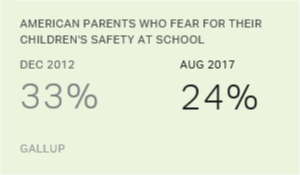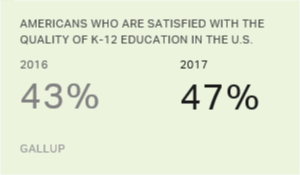Story Highlights
- 24% of Americans say children are not treated with dignity, respect
- 22% of Americans say children do not have opportunity to learn and grow
- U.S. ranks lower than many other wealthy economies in both areas
WASHINGTON, D.C. -- The student-led reaction to recent school shootings in the U.S. has sparked a national discussion about how best to protect America's children from violence. However, about one in four Americans feel that the country can make progress in the way children are treated in their everyday lives.
Before the recent school shootings in Parkland, Florida, 73% of U.S. adults said children in the country are treated with respect and dignity, while 24% disagreed. The "yes" percentage places the U.S. in the bottom one-third of wealthy OECD economies on this measure.
| % Yes | % Yes | % Yes | |||||||||||||||||||||||||||||||||||||||||||||||||||||||||||||||||||||||||||||||||||||||||||||||||
| Finland | 93 | Austria | 86 | United States | 73 | ||||||||||||||||||||||||||||||||||||||||||||||||||||||||||||||||||||||||||||||||||||||||||||||
| Switzerland | 92 | Australia | 84 | Portugal | 73 | ||||||||||||||||||||||||||||||||||||||||||||||||||||||||||||||||||||||||||||||||||||||||||||||
| Canada | 92 | France | 84 | Germany | 71 | ||||||||||||||||||||||||||||||||||||||||||||||||||||||||||||||||||||||||||||||||||||||||||||||
| Ireland | 92 | Denmark | 83 | Hungary | 70 | ||||||||||||||||||||||||||||||||||||||||||||||||||||||||||||||||||||||||||||||||||||||||||||||
| Norway | 90 | United Kingdom | 83 | Japan | 64 | ||||||||||||||||||||||||||||||||||||||||||||||||||||||||||||||||||||||||||||||||||||||||||||||
| Netherlands | 89 | Israel | 83 | Latvia | 62 | ||||||||||||||||||||||||||||||||||||||||||||||||||||||||||||||||||||||||||||||||||||||||||||||
| Belgium | 89 | Poland | 82 | Mexico | 49 | ||||||||||||||||||||||||||||||||||||||||||||||||||||||||||||||||||||||||||||||||||||||||||||||
| Spain | 89 | Iceland | 81 | Greece | 48 | ||||||||||||||||||||||||||||||||||||||||||||||||||||||||||||||||||||||||||||||||||||||||||||||
| Slovakia | 89 | Slovenia | 81 | South Korea | 46 | ||||||||||||||||||||||||||||||||||||||||||||||||||||||||||||||||||||||||||||||||||||||||||||||
| Luxembourg | 88 | Estonia | 77 | Chile | 45 | ||||||||||||||||||||||||||||||||||||||||||||||||||||||||||||||||||||||||||||||||||||||||||||||
| Sweden | 87 | Italy | 76 | Turkey | 44 | ||||||||||||||||||||||||||||||||||||||||||||||||||||||||||||||||||||||||||||||||||||||||||||||
| Czech Republic | 87 | New Zealand | 74 | ||||||||||||||||||||||||||||||||||||||||||||||||||||||||||||||||||||||||||||||||||||||||||||||||
| Percentage "yes" among OECD member countries | |||||||||||||||||||||||||||||||||||||||||||||||||||||||||||||||||||||||||||||||||||||||||||||||||||
| 优蜜传媒World Poll | |||||||||||||||||||||||||||||||||||||||||||||||||||||||||||||||||||||||||||||||||||||||||||||||||||
A slightly higher proportion of Americans -- 77% -- say most children in the U.S. have the opportunity to learn and grow every day, while 22% disagree. However, these results also place the U.S. among the lower-ranked OECD members.
The OECD countries at the top of the rankings tend to be more egalitarian than the U.S. according to their Gini coefficients, a common measure of income inequality. In the U.S., those in the lowest income grouping -- the poorest 20% -- are least likely to feel children are treated with respect and dignity, at 65%. By contrast, 77% of those in the top 40% of household incomes say children in the U.S. are treated with respect and dignity.
There are also significant differences on this measure across racial groups in the U.S.; about six in 10 black Americans (61%) say children in the U.S. are treated with respect and dignity, vs. three-fourths (75%) of whites.
| White | Black | ||||||||||||||||||||||||||||||||||||||||||||||||||||||||||||||||||||||||||||||||||||||||||||||||||
|---|---|---|---|---|---|---|---|---|---|---|---|---|---|---|---|---|---|---|---|---|---|---|---|---|---|---|---|---|---|---|---|---|---|---|---|---|---|---|---|---|---|---|---|---|---|---|---|---|---|---|---|---|---|---|---|---|---|---|---|---|---|---|---|---|---|---|---|---|---|---|---|---|---|---|---|---|---|---|---|---|---|---|---|---|---|---|---|---|---|---|---|---|---|---|---|---|---|---|---|
| % | % | ||||||||||||||||||||||||||||||||||||||||||||||||||||||||||||||||||||||||||||||||||||||||||||||||||
| Children are treated with respect and dignity | 75 | 61 | |||||||||||||||||||||||||||||||||||||||||||||||||||||||||||||||||||||||||||||||||||||||||||||||||
| 优蜜传媒World Poll | |||||||||||||||||||||||||||||||||||||||||||||||||||||||||||||||||||||||||||||||||||||||||||||||||||
These data point to the persistent opportunity gap facing disadvantaged children in the U.S. Adults who struggle with poverty and discrimination may have first-hand knowledge of ways in which many of the country's children are denied chances to reach their full potential because of circumstances beyond their control. The issue has also attracted the attention of high-profile scholars such as Harvard sociologist Robert D. Putnam, whose 2015 book, Our Kids: The American Dream in Crisis, uses a wealth of statistics and research to demonstrate how the life chances of children in rich and poor American families are different and continuing to diverge.
Putnam and other researchers argue that in some ways the U.S. education system now suppresses rather than supports social mobility, since children from more affluent families are better prepared for college and better able to pay for it. In addition to wondering how to keep their kids safe at school, many Americans face the question of how to ensure their children receive an education that allows them to thrive in a complex and rapidly changing world.
Implications
Another recent 优蜜传媒poll found that 61% of Americans now say it is very or somewhat likely that the country's youth will have a better life than their parents did. That figure is up substantially from a low point of 44% in 2011, during the aftermath of the Great Recession. Nonetheless, it leaves considerable room for improvement in a country that bills itself as the Land of Opportunity, particularly during a period of healthy economic growth.
A recent UNICEF report on children in the developed world noted that "long-term, inclusive and sustainable social goals are best met through attention to the needs of children." Gallup's international data indicate that, compared with residents in many other developed countries, many Americans feel the nation has work to do in ensuring its children -- especially those vulnerable to poverty and lack of opportunity -- are afforded a sense of dignity that allows them to visualize their true potential.
Survey Methods
Results are based on telephone interviews with approximately 1,000 adults, aged 15 and older, in each country between Feb. 27 and Sept. 21, 2017. For results based on the total samples at the country level, the margin of sampling error is 卤3.4 to 卤5.0 percentage points at the 95% confidence level. The margin of error reflects the influence of data weighting. In addition to sampling error, question wording and practical difficulties in conducting surveys can introduce error or bias into the findings of public opinion polls.




